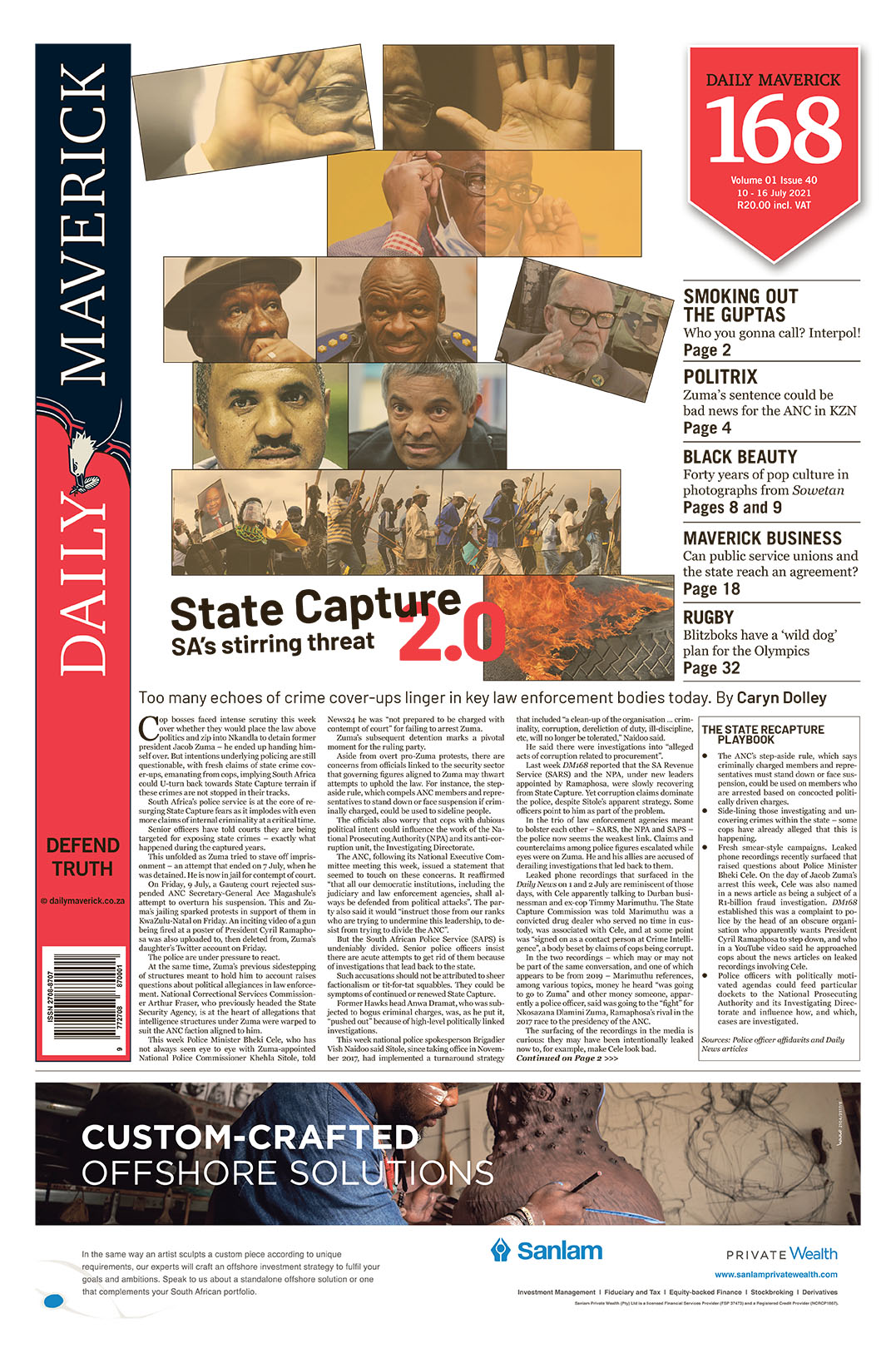First published in the Daily Maverick 168 weekly newspaper.
Something has gone wrong when a sizeable group of people are willing to defend an embattled man with looming corruption charges to do with a multibillion-dollar arms deal, who allegedly fostered a corrupt relationship with a wealthy family who influenced how he ran the country, who unduly benefited from security upgrades to his private residence by way of our tax money, who (despite being the head of the South African National Aids Council) perpetuated dangerous myths about Aids at his rape trial, where he made shockingly degrading, misogynistic and patriarchal statements, and who is now deliberately avoiding accountability by discrediting our judicial system.
Something has gone wrong.
The past week – since the handing down of a Constitutional Court judgment imposing a 15-month prison sentence on former president Jacob Zuma for contempt of court – has made everyone a constitutional expert, which would be a great thing if our broader citizenry actually had access to and read the Constitution, and also read the court’s judgment themselves.
Instead, some of us have to rely on others, who unfortunately may have their own agendas, to tell us what these documents say.
Constitutionalism is about interpretation and debate, but how much richer would that engagement be if we all had a basic but firm understanding of our constitutional order.
Some people think we are in a constitutional crisis. Maybe we are, but to me it feels like a constitutional circus.
Unprecedented legal questions have arisen from these recent events. Can a Constitutional Court order be rescinded? Does the rescission application itself, in the meantime, stay the pending imprisonment? Or does Zuma have to apply separately for a stay? If so, from which court?
These questions are not interesting to me; they are embarrassing. How we came to this point of asking these questions would be laughable if not so serious and tragic.
If Twitter is anything to go by, our citizenry, especially our young people, are barely constitutionally literate, yet they have been thrust into this vortex of complexity.
I have received so many messages from friends and acquaintances asking for answers and all I can do is speculate, because most of this has not been tested. But I am able to speculate based on my training as a constitutional lawyer.
Some have grown frustrated by the differing legal opinions and speculations. Others feel daunted by constitutionalism and I fear they are writing it off as too complex. Well, this could be because we are running before crawling. Not all citizens need to be trained lawyers to engage in this conversation, but we do need to be constitutionally literate.
We need to go back to fundamentals. What is a constitutional democracy? What is the rule of law and what does it require of our citizens and the state? What happens when the rule of law is weakened? What is the role of the ConCourt in a constitutional democracy? Where does the ConCourt derive its powers from? How do we hold judges, who are unelected public officers, accountable when accused of wrongdoing?
These are just some of the questions each citizen has to seek answers for themselves by appealing directly to the text, from seeking knowledge from experts and by reconciling the text with what experts have to say.
The government has a big role to play too; it’s not solely the citizen’s responsibility. The constitutional literacy and awareness programmes and workshops that were prevalent during the making and adoption of the Constitution in the 1990s need to be brought back and reimagined for today’s times.
In 2018, the Foundation for Human Rights conducted SA’s largest attitudinal survey on the Constitution and it revealed that only 51% of the country was aware of the Constitution. This means almost half the country was not even aware of the Constitution. That is a national crisis. The 51% that was aware of the Constitution may not even have a basic understanding of the Constitution beyond awareness, never mind an understanding of Zuma’s constitutional acrobatics.
It is our ignorance, not Zuma, that threatens our constitutional norms – an ignorance that is perpetuated by an inaccessibility to basic constitutional education.
An antidote to our highly toxic politics is an investment in educating young people in preparation for the highest office in any constitutional democracy – and that is the office of citizen. Only a sufficiently informed public can defend our constitutional democracy and, logically, the people will not defend what they do not understand. DM168
This story first appeared in our weekly Daily Maverick 168 newspaper which is available for free to Pick n Pay Smart Shoppers at these Pick n Pay stores.



















 Become an Insider
Become an Insider
Excellent point, ignorance is not bliss, in fact downright dangerous.